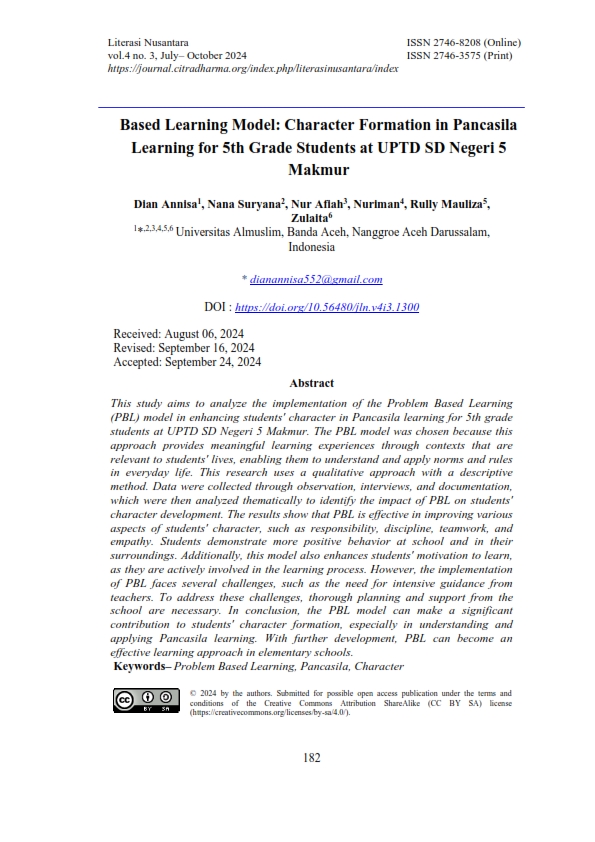Based Learning Model: Character Formation in Pancasila Learning for 5th Grade Students at UPTD SD Negeri 5 Makmur
DOI:
https://doi.org/10.56480/jln.v4i3.1300Keywords:
Problem Based Learning, Pancasila, CharacterAbstract
This study aims to analyze the implementation of the Problem Based Learning (PBL) model in enhancing students' character in Pancasila learning for 5th grade students at UPTD SD Negeri 5 Makmur. The PBL model was chosen because this approach provides meaningful learning experiences through contexts that are relevant to students' lives, enabling them to understand and apply norms and rules in everyday life. This research uses a qualitative approach with a descriptive method. Data were collected through observation, interviews, and documentation, which were then analyzed thematically to identify the impact of PBL on students' character development. The results show that PBL is effective in improving various aspects of students' character, such as responsibility, discipline, teamwork, and empathy. Students demonstrate more positive behavior at school and in their surroundings. Additionally, this model also enhances students' motivation to learn, as they are actively involved in the learning process. However, the implementation of PBL faces several challenges, such as the need for intensive guidance from teachers. To address these challenges, thorough planning and support from the school are necessary. In conclusion, the PBL model can make a significant contribution to students' character formation, especially in understanding and applying Pancasila learning. With further development, PBL can become an effective learning approach in elementary schools.
References
Ardiansyah Ricky, M., Indiati, I., & Sugiyanti. (2022). Analisis Kemampuan Berpikir Kritis Siswa dalam Menyelesaikan Masalah Matematika Ditinjau dari Kemampuan Penalaran Matematis. Jurnal Matematika Dan Pendidikan Matematika, 4(3), 205–213.
Azhari, A., Sumanti, S., & Novalita, R. (2023). Development of Social Science Education Teaching Modules for Character Building by Strengthening the Pancasila Student Profile. International Journal of Educational Dynamics, 6(1), 342-348.
Azimah, S. (2023). Inovasi Pembelajaran Berbasis Masalah di Era Digital. Yogyakarta: Andi Publisher.
Budimansyah, D., & Dahliyana, A. (2024). Strengthening Students Character Values through Pancasila Integration Teaching: Evaluation and Development of Values through Citizenship Project Model. Educational Administration: Theory and Practice, 30(5), 639-648.
Dewi, D. P., Aeni, A. N., & Nugraha, R. G. (2023). Development of website-based learning media on the practice of pancasila on student learning motivation. Jurnal Cakrawala Pendas, 9(2), 250-261.
Fisher, R. (2022). Berpikir Kritis dalam Pendidikan. Jakarta: Gramedia.
Kartikasari, R. (2021). “Penerapan Model PBL untuk Meningkatkan Kemampuan Berpikir Kritis Siswa pada Kelas V Sekolah Dasar”. Jurnal Pendidikan Dasar, 13(1), 45-55.
Khairi, A. M., Ananda, R., & Sitorus, A. S. (2023). The Implementation of Student Character Model at Public High Schools In Tanjungbalai City. Edukasi Islami: Jurnal Pendidikan Islam, 12(001).
Komalasari, K., Abdulkarim, A., & Sopianingsih, P. (2024). Digital-Based Living Values Project Activities Learning Model for Strengthening Students’ Pancasila Character. The New Educational Review, 75, 127-139.
Melmambessy, Moses. (2022). Pendidikan sebagai Proses Pengalihan Pengetahuan Secara Sistematis. Bandung: Alfabeta.
Oktaviani, N. L. M. M., Wibawa, I. M. C., & Riastini, P. N. (2023). Project Based Learning (PjBL) Model in the Pancasila Learning Profile of Fourth Grade Elementary School Students. Journal for Lesson and Learning Studies, 6(3).
Sartika, M. M., & Dedy, T. (2023, June). Analysis Of The Application Of Pancasila Student Profile In The Character Forming to Students In Elementary School. In International Conference on Elementary Education (Vol. 5, No. 1, pp. 404-413).
Susanti, A., Darmansyah, A., Tyas, D. N., Hidayat, R., Syahputri, D. O., Wulandari, S., & Rahmasari, A. (2023). The Implementation of Project for Strengthening the Profile of Pancasila Students in the Independent Curriculum for Elementary School Students. IJECA (International Journal of Education and Curriculum Application), 6(2), 113-122.
Widarini, N. W. W., & Suterji, N. K. (2023). Implementation of The Profile Strengthening of Pancasila Student Profile (P5) in Building Student Character in First Middle School. International Journal of Multidisciplinary Sciences, 1(2), 218-231.
Zakiah, L., & Herawati, E. (2024). The Picture Storybook of Pancasila Values as the Formation of National Character in Pancasila and Civics Education Learning Class Five of Elementary School in Indonesia. JTP-Jurnal Teknologi Pendidikan, 26(1), 32-43.

Downloads
Published
Issue
Section
Categories
License
Copyright (c) 2024 Dian Annisa, Nana Suryana, Nur Afiah, Nuriman, Rully Mauliza, Zulaita

This work is licensed under a Creative Commons Attribution-ShareAlike 4.0 International License.
Copyright Notice
Authors who publish with this journal agree to the following terms:
- Authors retain copyright and grant the journal right of first publication with the work simultaneously licensed under a Creative Commons Attribution-ShareAlike 4.0 International License that allows others to share the work with an acknowledgment of the work's authorship and initial publication in this journal.
- Authors are able to enter into separate, additional contractual arrangements for the non-exclusive distribution of the journal's published version of the work (e.g., post it to an institutional repository or publish it in a book), with an acknowledgment of its initial publication in this journal.
- Authors are permitted and encouraged to post their work online (e.g., in institutional repositories or on their website) prior to and during the submission process, as it can lead to productive exchanges, as well as earlier and greater citation of published work (See The Effect of Open Access).

This work is licensed under a Creative Commons Attribution-ShareAlike 4.0 International License.



















